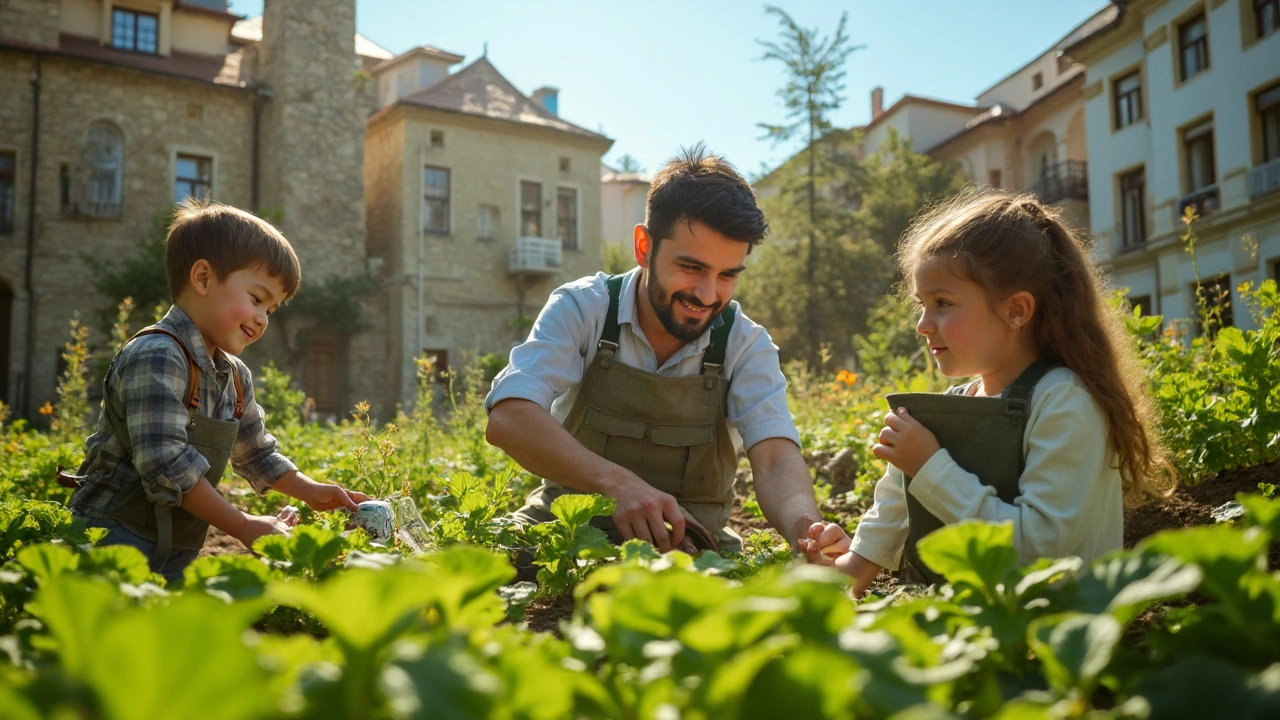Ever thought about how family activities can double up as life lessons? Picture this: you’re in the kitchen with your kids, everyone’s hands are dusty with flour, and you’re teaching them how to bake their first loaf of bread. It’s more than just a cooking session; it’s a crash course in patience, following instructions, and working as a team.
Now, you might be wondering, what other activities can offer this kind of education while keeping things fun? From gardening to organizing simple weekend projects, there are loads of options to explore. Imagine your yard as a thriving garden where kids learn about nurturing plants, responsibility, and the miracle of growth. It's educational, hands-on, and—believe it or not—can also be quite relaxing for adults!
These activities aren’t just time-fillers; they’re building blocks for skills like critical thinking and creativity. And guess what? You don’t have to look far to find opportunities. Many community centers and local parks offer family-friendly classes and workshops, where you can learn something new together. It’s all about turning everyday fun into meaningful lessons.
- Key Points
- Direct Answer
- Importance of Family Activities
- Benefits and Examples
- Finding Activities Near You
- FAQs
Key Points
Engaging in family activities is a fantastic way to bond while learning essential life skills. These activities transform everyday moments into opportunities to teach values like responsibility, patience, and problem-solving.
Cooking together is a brilliant start. Not only does it teach kids about nutrition and the process of preparing a meal, but it also highlights the importance of following instructions and working collaboratively. Imagine the satisfaction on your kids' faces when they have a hand in creating dinner!
Gardening: A Lesson in Patience and Responsibility
Gardening is perfect for instilling patience and responsibility in children. Watching a plant grow from a tiny seed into a grand plant is a magical experience for a child. It's also an ongoing project that requires regular attention, teaching kids how consistent effort over time can yield results.
Craft Projects: Boost Creativity and Problem Solving
Simple craft projects are another way to enhance creativity. When kids are tasked with creating something from scratch, it encourages them to use their imagination and improve problem-solving skills. Crafts can range from making greeting cards to building model structures using recycled materials.
Useful Stats: Home-Based Activities
| Activity | Avg. Duration (per session) | Life Skills Taught |
|---|---|---|
| Cooking | 90 minutes | Teamwork, following instructions |
| Gardening | 45 minutes | Responsibility, patience |
| Crafting | 60 minutes | Creativity, problem-solving |
These activities are more than just productive time-fillers. Parenting tips suggest that such activities can lead to improved communication within families, a crucial skill as children grow. Plus, parents often find these activities enjoyable too, a shared escape from routine pressures.
Direct Answer
Family activities aren't just for passing the time—they're a fantastic way to teach important life skills. Why does this matter? Because the skills learned during these moments can last a lifetime, helping kids grow into well-rounded adults.
Think about this: when you engage in cooking activities with your kids, you're doing more than just making dinner. You're teaching them math through measuring ingredients, enhancing their patience while waiting for the dough to rise, and encouraging creativity as they decide on toppings for that homemade pizza. These skills are practical, applicable, and fun to learn together.
Then there's gardening, one of the most rewarding family activities. It's not just about planting seeds but about nurturing responsibility. Kids experience firsthand where their food comes from and the effort required to produce it. It's an engaging way to instill the value of hard work and dedication.
Not to mention game nights with board games or puzzles that spark strategic thinking and problem-solving skills. These evenings teach children how to play fair, cope with losses, and celebrate victories—all in a safe and supportive environment.
If you're wondering about stats, here's something interesting: families who spend time doing activities together have been shown to communicate better and report higher satisfaction in relationships. A family-focused study found that shared activities helped 70% of participants feel more connected—illustrating how these moments bring everyone closer.
In essence, family activities are more than fun and games—they're bridges to success in later life, packed with lessons waiting to be uncovered in the most delightful ways.
Importance of Family Activities
Family activities are more than just a way to spend time together; they’re a crucial part of child development and family bonding. When families engage in activities regularly, it leads to stronger relationships and creates a supportive environment for kids to grow. Think of these activities as a foundation for teaching life skills in a relaxed and fun setting.
Studies have shown that children who spend more time in family activities tend to perform better academically and socially. They learn the art of cooperation, patience, and problem-solving naturally, often without even realizing it’s happening. This is because they’re picking up cues from you as they participate in these activities.
Bonding and Communication
Ever noticed how a simple family game night can turn into a memorable evening? These moments are essential for building trust and communication skills among family members. When everyone participates, it encourages open conversations and shared experiences. Plus, it’s a chance to disconnect from screens and digital devices—a real rarity these days!
Mental and Physical Health Benefits
Family activities often involve physical movement, which is excellent for everyone’s health. Whether it’s a hike, a biking trail, or a swimming session, these activities boost physical endurance and contribute to better mental health. The joy and laughter shared reduce stress and promote a positive mindset.
Even indoor activities like cooking or crafting can be invigorating. Kids learn culinary skills or crafty DIYs while tapping into creativity. The benefits extend beyond just fun; it’s about nurturing well-rounded individuals who can handle life’s challenges.
According to a recent survey, families who regularly engage in such activities report a 20% increase in happiness levels. These activities not only enrich your family life but also prepare your kids for the future.

Benefits and Examples
Engaging in family activities is not just about spending time together; it's about learning pivotal life skills. Let's dive into some benefits and relatable examples that you can easily replicate with your family.
Building Responsibility and Teamwork
One significant benefit is the development of responsibility and teamwork. Take the example of gardening. Assigning kids their own plant to care for teaches them about accountability and the importance of regular upkeep. They learn firsthand what happens when they water too much or too little. Working together in a family garden also fosters teamwork—everyone has a role, and completing tasks together strengthens bonds.
Enhancing Problem-Solving Skills
Problem-solving is another key life skill enhanced by family activities. Imagine building a paper-mâché volcano for a school project. Kids encounter challenges like structural integrity and the chemical reaction for the 'eruption.' By tackling these issues with guidance, they build strong problem-solving skills which are valuable throughout life.
Encouraging Creativity and Patience
Activities like cooking or crafting boost creativity. When kids take part in planning a meal or turning a household item into a work of art, they’re using their imagination to create something unique. Cooking is also a delightful way to teach patience; waiting for a cake to bake is a real exercise in delaying gratification.
Fun Learning Examples
- Baking Together: Enhance math skills by measuring ingredients and following a recipe.
- Bike Riding: Plan a family bike ride which involves following directions and understanding traffic rules, promoting awareness and safety.
- Weekly Board Games Night: Choose games that focus on strategy and planning, helping children improve logical thinking.
Physical and Mental Health Benefits
Don’t overlook the physical and mental health perks. Engaging in regular physical activities like hiking or biking improves cardiovascular health and reduces stress levels. Family-friendly activities boost mood and encourage a positive outlook.
Interesting fact: Studies show that families who engage in regular activities together report 20% higher happiness levels. It’s a win-win situation where everyone benefits physically, mentally, and emotionally.
Finding Activities Near You
So, you’re all set to dive into some engaging family activities and teach some important life skills. But where do you start looking? The good news is, with a bit of local exploration and online searches, you'll find plenty of options right around the corner.
First stop, check out your local community center. Many centers offer seasonal classes and workshops that cater to families. From art classes that nurture creativity to cooking sessions that boost kitchen confidence, there’s usually something for everyone.
Explore Local Libraries
Don’t forget to swing by your neighborhood library. Libraries often host events and activities aimed at families. These range from story times for young kids to STEM workshops for older ones. Plus, they’re often free, which is always a bonus.
Join Online Communities
Another great way to discover family-friendly activities is to join local parenting groups online. Platforms like Facebook have groups dedicated to neighborhood parents where members share recommendations, experiences, and upcoming events. You’d be surprised at how much goes on around you that you might not know about!
Outdoor Options
Let’s not forget about parks and outdoor facilities. Many local parks offer organized activities such as hiking clubs or nature exploration programs. If you have a park nearby, check their bulletin board or website to see what’s on the calendar.
Check Local Schools
Sometimes, schools collaborate with local businesses to offer weekend workshops or family-friendly events. It’s worth calling your child’s school or checking their newsletter to see if any partnerships are happening.
Let’s put this info into perspective: say you’re interested in a gardening workshop for the family. Start by searching "gardening workshops near me." Visit local garden centers or botanical gardens; they often host events or have information on nearby workshops.
| Activity | Location | Notes |
|---|---|---|
| Cooking Class | Community Center | Check seasonal schedules |
| Story Time | Public Library | Weekly events, often free |
| Hiking Club | Local Park | Weekend family hikes |
With these tips, you're well-equipped to find and make the most of opportunities right where you live. It’s all about turning an ordinary day into an unforgettable family adventure that teaches skills without feeling like a chore!
FAQs
Wondering about family activities that teach life skills while keeping everyone entertained? You're in the right place. Let's tackle some of the most common questions and make sure you're set for the next family adventure.
What Are Some Easy Activities to Start With?
Starting simple goes a long way. Think about activities like cooking a meal together, which can teach everything from measuring to time management. Gardening is another fantastic choice—kids learn to nurture and care for living things, while understanding patience and the rewards of hard work. Both activities are great starting points and require minimal cost and effort.
How Can I Make Activities Engaging for Different Age Groups?
When planning activities, consider everyone’s skills and interests. Younger kids might enjoy storytelling with shadow puppets, while older ones could help with organizing a small backyard cleanup project. Customize tasks within the activity to fit different age levels, keeping everyone involved and motivated.
Why is it Important to Teach Life Skills Through Family Activities?
It’s simple: family activities create natural learning environments. When kids are having fun, they are more open to learning new concepts. Teaching life skills through these activities means they pick up valuable lessons that stick with them long after the fun is over. Plus, it's a great way to strengthen family bonds.
Do We Need Special Equipment?
Not really. Most family activities don't require much beyond what's at home. For cooking, you'll use your regular kitchen tools. Gardening might need some simple supplies like seeds and soil, but these are easily available and don't break the bank.
How Often Should We Plan These Activities?
There's no strict rule here. It depends on your family's schedule, but incorporating them once a week or biweekly can create a routine. The key is consistency rather than frequency, so choose a pace that everyone can enjoy without feeling overwhelmed.
Are There Any Safety Tips?
Always consider safety, especially with younger children. In the kitchen, supervise children when using sharp tools or hot surfaces. In the garden, teach them the importance of washing hands after handling soil. Basic precautions ensure a fun and safe experience for everyone.













